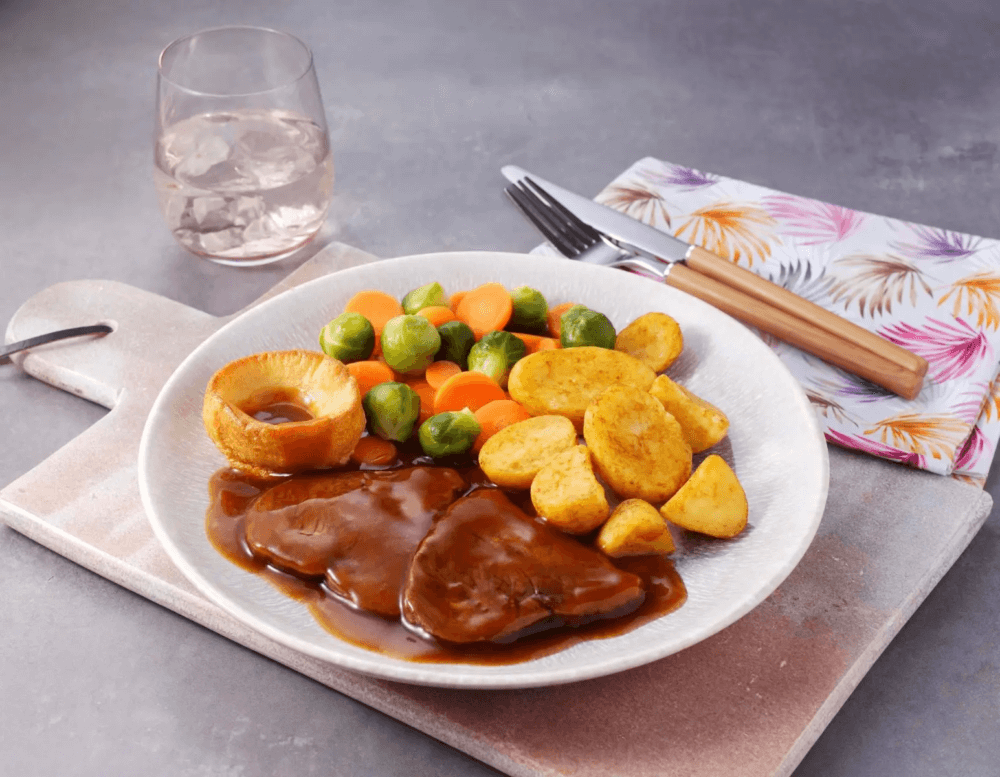How to get hot meals delivered for the elderly

Arranging hot meals for ageing adults at home
Ensuring older people have access to nutritious, healthy, comforting meals every day is so important, but several factors can make daily cooking difficult. If you are looking into meal delivery services for yourself or an older relative, we are taking a look at what these services offer, why they can be incredibly useful, what the pros and cons are, how much they cost, and which are the very best services to use in the UK.
At Home Instead, our aim is to help people age positively and in place by bringing expert care to their home. For nearly 20 years, we have been providing the highest standard of care, and creating industry-leading training programmes for our Care Professionals that are accredited by nursing and medical professionals. Today, we are the world’s largest global home care network, supporting over 100,000 older adults with personalised, tailored care at home. So whatever questions you have about home care, we can help.
Why might some older people struggle to obtain hot meals?
As we get older, accessing healthy meals can become more of a challenge, and there are a number of reasons this could be the case for you. For example:
- Mobility challenges: Eating three meals a day or more will require preparation and cooking, which can be difficult when someone struggles to stand, move around safely, or lacks dexterity in their hands. This can make it more of a challenge to shop for groceries, use kitchen utensils and more.
- Loss of appetite: This is very common among older adults, as studies estimate around 20% of older people will see a notable loss of appetite. This is usually nothing to worry about unless there is sudden, unexplained weight loss. You may find some useful tips in our guide on stimulating appetite in the elderly.
- Tiredness: Issues with fatigue can cause some people to eat less due to a general lack of motivation to get up and spend time cooking.
- Mouth or digestive issues: Certain problems can affect the ability to eat, and could mean a lack of necessary nutrients. These include troublesome dentures, dry mouth (which affects around a third of people aged 65+), digestive problems (research says 30-40% of older people suffer from chronic constipation), and more.
- Health conditions: Conditions such as dementia or Alzheimer’s may cause forgetfulness in daily life that leads to skipped meals.
As well as the above, an older individual may experience a general lack of motivation, inspiration or desire to cook in their later years, and this is perfectly understandable. In any case, there are many fantastic meal delivery services available that could save time and energy by outsourcing the task of cooking, while ensuring you or your loved one receives healthful and tasty meals every day.

What do hot meal delivery services provide?
You may have heard it called Meals on Wheels in the past, but the concept has developed a lot in recent years now that recipe delivery services are popular. These services can often provide:
- Hot meals
- Fresh meals that are ready-to-reheat
- Frozen meals
- Meals for specific dietary requirements, such as vegetarian, vegan, coeliac, gluten-free, diabetic, kosher, halal, and more
- Meals for specific health needs, such as puréed food or softer food
- Snacks, breakfasts, and desserts
- Additional grocery deliveries
What are the benefits of organising meal deliveries for older people?
Older people will find there are many benefits to organising a meal delivery service. You may wish to organise this for yourself or ask a loved one to help you set this up. The benefits of meal deliveries include:
- There is no cooking required if you lack energy or suffer from regular fatigue
- There is no cooking required if you have a disability or lack mobility for any reason
- You can receive healthy, balanced meals where all of your nutritional needs are met
- You can get deliveries straight to your door so you do not need to leave the house for groceries or tackle a big weekly food shop
- There is minimal preparation time, with most meal delivery services requiring just a microwave or oven
- Mealtimes become much easier if you have impaired vision
- There is no reason to turn to unhealthy options like takeaway or supermarket ready meals for ease
- You will receive better, tastier meals than you may be able to prepare yourself at home
- There is the potential to try foods you have never tried before
- You can conveniently eat as soon as you feel hungry, rather than spending time cooking
- There is less stress or anxiety about what to cook
- There is less food waste, as you only reheat and eat what you feel like
- It is easier to maintain a healthy weight with pre-portioned food
- You can ensure sufficient water intake every day
- It is easier to eat regularly, which is especially helpful if you live with a condition such as dementia or diabetes.
For families, meal delivery may also be a helpful option if you have been cooking for an older loved one and cannot continue doing this due to other commitments.
Are there any downsides to organising meal deliveries?
Meal deliveries can be incredibly helpful and can take a lot of pressure off older people who are no longer able to, or no longer want to cook. However, as with any service, there are downsides to consider such as:
1. Choice
If you enjoy whipping up dinner based on whatever your preferences are that day, then using a meal delivery service might restrict you in this area. There are options such as frozen meals which will allow you to cook whichever portion of food you decide on from the week or two weeks’ worth of options you have had delivered. However, if you would like total freedom in your choice of dinner, meal delivery services may not offer what you need.
2. Loneliness
If you feel isolated, a meal delivery service may not be the best option for you. Although it means you can avoid cooking, you may feel you need to stay in your home alone to eat what has been delivered rather than meet family or friends for social dinners.
3. Food temperature
If you are particularly sensitive to the temperature of food and you organise meal delivery services from an organisation that delivers hot food, this may not always arrive piping hot the way you like it; instead, it could arrive lukewarm or even cold. The company should try their best not to let this happen, but sometimes it is unavoidable and you will need to be OK with reheating your meal in the microwave.
4. Delivery times
You will usually need to be in your home to receive your delivery and be prepared to put items away in the fridge or freezer if applicable. You may be able to choose which delivery day you have, but not always.
5. Cost
This can be off-putting for some people as meal deliveries can end up becoming more expensive than a typical weekly food shop that you cook yourself. Although there are a number of price points (which you will see in some of the options we have included below), if keeping your costs low is a priority for you then meal deliveries may feel too expensive.
6. Independence
When tasks are taken out of your hands before you have lost the physical ability to do them, this can affect your sense of independence. If you are looking into starting a meal delivery service for yourself or a loved one, it can be beneficial to wait until you/they definitely need help with cooking, rather than organising it simply to make life easier.
Are hot meals, fresh meals or frozen meal deliveries best?
It is entirely up to you whether you would prefer hot, fresh or frozen meals. To clarify, hot meals will come warmed up and ready to eat, fresh meals will come cold but ready to reheat in the microwave or oven whenever you are ready, and frozen meals come frozen but can be defrosted and cooked whenever you are ready.
Hot meal delivery: pros and cons
The benefits of hot meals are that there is no delay between delivery and eating, and you do not need to do anything at all to start enjoying your meal. The downside of this is that you may not always be ready to eat when your delivery comes, and if there are any delays with the delivery you could become hungry while waiting.
Fresh meal delivery: pros and cons
The benefits of fresh meals are that the ingredients are all fresh, but you can still put them in the fridge and cook them when you feel hungry. On the other hand, fresh meals will have a shorter shelf life than frozen meals so they must be eaten within a few days of delivery.
Frozen meals: pros and cons
The benefits of frozen meals are that they can be put in the freezer and have a long shelf life (often many months, check the packaging) so they can be eaten when you are hungry, helping to avoid food waste. There are few downsides to frozen meals, other than the freezer space they take up – this means less can be stored in a small freezer.

Do you need anything at home to cook meal deliveries?
If you are having hot meals delivered you may not need anything to eat these, however fresh or frozen meal deliveries usually need a microwave and/or an oven to cook, and a fridge or freezer to store meals.
For all meal deliveries, it is helpful to have a comfortable chair at a table set with the crockery and cutlery you need, or you may prefer to eat in a chair while watching television or listening to music, in which case a lap tray can be very helpful as a flat surface to eat on.

What are the best meal delivery services in the UK for older people?
There are several meal delivery services out there, some aimed at older individuals who do not want to or cannot cook anymore, others aimed at the general population who want to save time and energy on cooking. Here are a few of the best meal delivery services, with some useful information about each:
COOK
- Fresh, frozen or hot? Frozen.
- What kind of meals do they deliver? A mix of vegetarian, classic meat dishes, and puddings, and they pride themselves on using healthy ingredients that make their meals taste homemade and delicious. Their food boxes for one can include anything from healthy ready meals to special diet foods to quick lunches to comfort food.
- Who would this be best for? For those not on a particularly strict diet or with dietary requirements, COOK meals offer lots of classic favourites that can be delivered frozen and put in the oven when you feel hungry.
- What’s the price like? There are different payment options available, but their ‘Meal Box for 1’ is £77.85 for 14 meals, which makes each meal around £5.56.
- Learn more on their website.
Parsley Box
- Fresh, frozen or hot? Parsley Box meals are long-life, so they can be put in a cupboard for up to 6 months and won’t take up room in your fridge or freezer.
- What kind of meals do they deliver? All the classics; lasagne, stews, shepherd’s pie, hotpots and more, as well as some Thai, Chinese and Indian favourites. There are also soups, sides and desserts.
- Who would this be best for? While there are options for vegetarians, most of their meals are meat-based and would likely be best for those who enjoy a hearty, warming meal.
- What’s the price like? They do deals such as 4 for £13.50, which works out at £3.30 per meal. There are also individual meals priced as low as £2.95.
- Learn more on their website.
Lions Prep
- Fresh, frozen or hot? Fresh. Their meals are individually packaged in microwaveable containers that are ready to reheat.
- What kind of meals do they deliver? They update their menu regularly, but you will often find favourites like chicken tikka masala or burgers among more unique dishes – for example, at the time of writing their menu includes Lebanese Cauliflower Steak, a Citrus and Miso Tofu Poke bowl, and Hazelnut Dukkah Crusted Salmon.
- Who would this be best for? For those with a more adventurous palette, and who like to regularly switch up their meals. Also for someone tech-savvy, as they will be required to choose their meals in advance by logging into the website. As this one is more expensive than others on the list, it could be used as an occasional treat.
- What’s the price like? A 6-day meal plan starts at £55.50 per week, which works out at around £9.25, so this is a little on the pricier end.
- Learn more on their website.
Wiltshire Farm Foods
- Fresh, frozen or hot? Frozen.
- What kind of meals do they deliver? They have main meals, desserts and snacks, and they cater to vegetarian, kosher and halal requirements. They also offer helpful options such as softer foods that require less chewing, smaller meal sizes for those with a small appetite, and dietary requirements catered for. Plus their drivers are local, so you’ll regularly see a friendly face.
- Who would this be best for? This one would be best for those who aren’t so tech-savvy – their website makes it easy to save your favourite meals and repeat past orders, and you can call them directly if you have any difficulty.
- What’s the price like? Their bestsellers range from £4.05 per meal to £7.65, but their Essentials menu has meals from £2.99 – £3.85 for those looking to save money.
- Learn more on their website.
Allplants
- Fresh, frozen or hot? Frozen, and can be stored for up to 12 months.
- What kind of meals do they deliver? Healthy Buddha Bowls, pastas, risottos, curries, stews, noodles, pies, tarts, and more. They have different options such as high protein, winter menus, and they’re all plant-based.
- Who would this be best for? For vegans or vegetarians, health-conscious individuals, and those who prefer easy ready-meals that can be cooked in the oven or microwave. Not so great for those who are trying to save money, as they are slightly on the pricier end and you need to spend more for free delivery.
- What’s the price like? Their options start from £4.99 for a main meal, and you need to order £30s worth at a time. Also, you need to spend over £50 to get free delivery if you are subscribing.
- Learn more on their website.
Oakhouse Foods
- Fresh, frozen or hot? Frozen.
- What kind of meals do they deliver? They have more than 300 meals and desserts to choose from, covering a wide range of cuisines; you will find classics such as Italian meatballs and spaghetti, cottage pie and more. Plus there are vegetarian options, soups and light meals.
- Who would this be best for? For those who like a lot of choice when it comes to mealtime, and who would appreciate getting groceries delivered at the same time.
- What’s the price like? Prices range from around £4.40 for a main meal to £7.85, but they also have more affordable Mini Meals available for those with a smaller appetite.
- Learn more on their website.
Field Doctor
- Fresh, frozen or hot? Frozen.
- What kind of meals do they deliver? Dietitian-designed, chef-made frozen meals. Pastas, curries, cottage pies, fish, tagines, paella, and more unique dishes too.
- Who would this be best for? For those with specific dietary needs or health conditions who require a lot of thought put into their weekly menu. They cater for various dietary requirements such as vegan, vegetarian, gluten-free, dairy free and low FODMAP.
- What’s the price like? Single-serve meals are £6.99 each, and there is a minimum spend of £42.50. If you are subscribing, there is a 6-item minimum.
- Learn more on their website.
I Care Cuisine
- Fresh, frozen or hot? Hot or frozen.
- What kind of meals do they deliver? They cater to special diets such as diabetic, low fat, low carbohydrate, reducing moderate salt, high-energy, gluten-free, lactose-free, and even offer easy-chew or puréed meals. You will find favourites such as beef with roast potatoes, corned beef hash, shepherd’s pie and more.
- Who would this be best for? Those with specific dietary needs and those who enjoy a wide selection of hearty, warming meals.
- What’s the price like? Prices are not available on their website, but their intro offer gives a rough idea; a 4-week term minimum order of 4 meals a week is £2.99 per meal in week 1, £4.99 in week 2, £5.99 in week 3, and £7.80 in week 4. Plus you can choose a free tart, sponge, pie or crumble dessert with every meal.
- Learn more on their website.
Tiptree Meals
- Fresh, frozen or hot? Hot or frozen.
- What kind of meals do they deliver? They have a range on their menu that changes regularly, but to give you an idea of the kinds of meals they deliver; pork and apple casserole, steak and kidney pie, lamb steaklet, fish in parsley sauce, beef curry, liver casserole, savoury flan with salad, and more.
- Who would this be best for? Meat eaters will benefit most from this service, although there are vegetarian/vegan options but you may need to call them directly to discuss your needs.
- What’s the price like? Prices are not on their website, but some of their offers include £6.50 for mains and dessert, or £3 for a tea tray (sandwich and dessert).
- Learn more on their website.
How do you choose the best meal delivery service for you or your loved one?
Choosing a meal delivery service will require a little research into each company to ensure they will provide the type of food you enjoy, the dietary requirements you need, and are not over your budget. Many meal delivery services offer a trial period for less money, so it is advisable to try a few out to see if you like the food and get on with the delivery schedule. After a few weeks or months, you can decide on the one that suits you best.
It can also help to consider how much effort you can still put into preparation and cooking.
For example:
- If you have severe mobility issues or need help with every aspect of the meal process, a hot meal delivery service may be for you.
- If you are struggling a bit but can still use the microwave or oven and would like more choice over your mealtimes, fresh or frozen meal deliveries could be helpful.
- If you still enjoy cooking and can manage it, but perhaps lack meal inspiration or do not enjoy the grocery shopping element, a recipe kit delivery service like Gousto, HelloFresh or Mindful Chef could be useful.
- If you need more healthy snacks to eat throughout the day and ensure you are getting enough calories and sufficient nutritional intake, Graze has a great snack subscription service.

How do I organise meal delivery for myself or a loved one?
You can organise a meal delivery service for yourself or a loved one by either signing up online or reaching out to some of the above services to find out about their trial period offers and browse some of the meals they have available.
If you are struggling with setting up which meals you want delivered and your delivery schedule, don’t be afraid to ask a loved one to help you or to contact the company for assistance.
Alternatively, you may be eligible for meal delivery via your council or another local organisation. Your council can provide meals delivered straight to your home, if you are eligible. The eligibility criteria usually include:
- If you are 55 or over
- If you struggle to cook for yourself
- If you have recently come out of hospital
- If your carer or relative needs a break from cooking
- If you are physically or mentally unwell and need support
- If you have difficulty shopping for food
You can check if you are eligible and what services your local council provides, here.
Can home care help with meal deliveries?
Yes, our Care Professionals at Home Instead can help to accept meal deliveries when they arrive, put them away in the relevant place, and heat and serve up meals if you need help with this. They can also provide encouragement and reminders to eat, get involved in meal planning and preparation if you have specific dietary needs, and companionship during mealtimes.
We’re an award-winning home care provider and part of a worldwide organisation devoted to providing the highest quality relationship-led care for older people in their own homes. Arranging care for yourself or your loved one shouldn’t be stressful, so whatever questions you would like answered, feel free to reach out to the Home Instead team to discuss your needs.